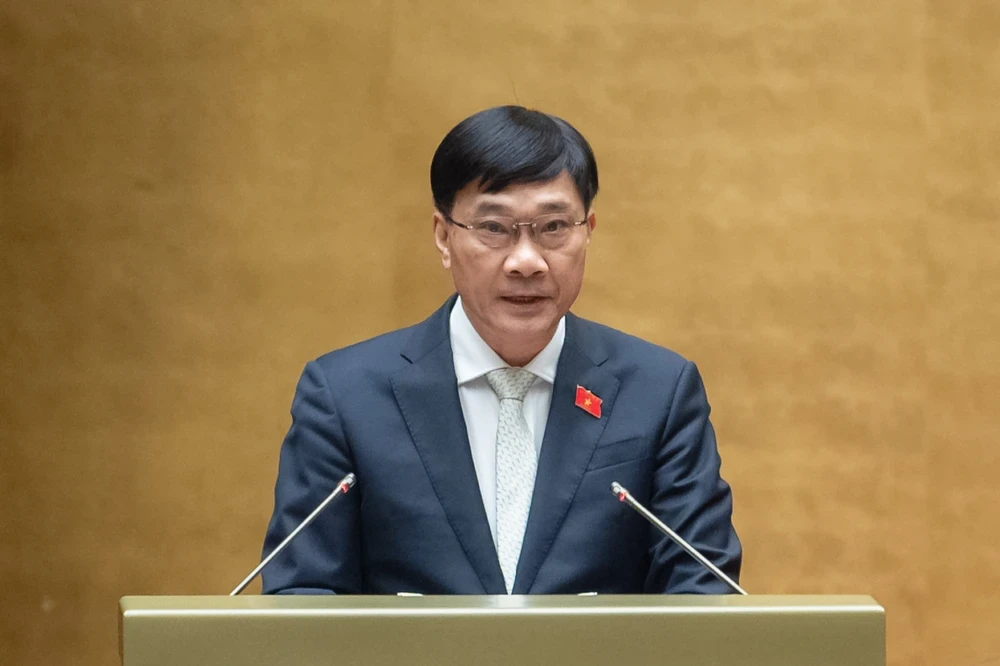In the process of receiving and completing the draft law, there are still many different opinions on the regulations on special control and special lending to credit institutions.

On the afternoon of November 23, continuing the program of the 6th Session of the 15th National Assembly, Chairman of the National Assembly's Economic Committee Vu Hong Thanh presented a report explaining, accepting and revising the draft Law on Credit Institutions (amended).
The draft consists of 15 chapters and 203 articles (an increase of 2 chapters and 8 articles, including 158 articles revised and adjusted compared to the draft law submitted to the National Assembly at the 5th Session).
Based on the Government's proposal, the Draft amends regulations related to limiting manipulation and control of credit institutions, including adjusting regulations on related persons to suit the type of people's credit funds; adjusting the share ownership ratio for individual shareholders to 5% (instead of 3% as in the draft law submitted to the National Assembly at the 5th Session) and stipulating a roadmap to gradually reduce the credit limit to 10% of equity for a customer and 15% of equity for customers and related persons within 5 years to minimize the impact.
During the process of receiving and completing the draft law, there are still many different opinions on the regulations on special control and special lending to credit institutions.
Regarding the application of early intervention in credit institutions and foreign bank branches (Article 156), some opinions suggest that it is necessary to carefully study and amend the regulations related to early intervention and banking risk management.
In response to the opinions of National Assembly deputies, the draft law has been revised in an earlier direction, specifically, in cases where the accumulated loss of a credit institution or foreign bank branch is greater than 15% of the value of charter capital, granted capital and reserve fund (compared to the draft law submitted to the National Assembly at the 5th Session, which is 20%), violating the solvency ratio for 30 consecutive days (compared to the draft law submitted to the National Assembly at the 5th Session, which is 3 consecutive months).
Regarding support for deposit payment to depositors in case banks are placed under special control, the Law on Deposit Insurance currently has no regulations. Therefore, the Standing Committee said that the majority of opinions agreed to add regulations on banks being allowed to borrow specially from other organizations according to the provisions of law.
Regarding the special lending regulations, the National Assembly Standing Committee accepted the opinions of the delegates in the direction of: Removing the contents related to banks that are allowed to borrow specially from deposit insurance organizations and other banks; the State Bank that provides special loans to deposit insurance organizations; instead, banks are allowed to borrow specially from other organizations according to the provisions of law.
The Prime Minister has the authority to decide on special loans with 0% interest rate per year to credit institutions under special control, because this is a case of indirect use of State resources in special cases to ensure system safety.
The Chairman of the Economic Committee added that the review and completion of this law was carried out carefully and thoroughly, closely following the Party's guidelines and policies, the National Assembly's Resolution, especially the task of continuing to complete the legal framework on bad debt handling, ending cross-ownership (one bank holding shares in another bank) while creating changes in the governance of credit institutions, increasing the resilience of credit institutions to external shocks.
However, according to Mr. Vu Hong Thanh, this is a very difficult, complicated, sensitive draft law, related to national financial security, the security and safety of the credit institution system, and has a profound impact on socio-economic activities. Therefore, the drafting and reviewing agencies must study it carefully and cautiously on the basis of science and practice.
The Chairman of the Economic Committee emphasized: "Considering and not passing the draft law at the 6th Session but considering and passing it at the next session is extremely necessary so that agencies have enough time to carefully and cautiously study and review the draft law."
After the 6th session, based on the opinions of the delegates, the National Assembly Standing Committee will continue to direct the agency in charge of the appraisal, the agency in charge of the drafting and relevant agencies to review and complete the draft law.
According to Vietnam+